
PERFORMANCE EVALUATION
Scope & Guideline
Elevating Standards in Performance Evaluation
Introduction
Aims and Scopes
- Performance Modeling and Analysis:
The journal emphasizes rigorous modeling techniques to analyze the performance of systems, including queueing models, Markov processes, and simulation methodologies. - Resource Management and Optimization:
A significant focus is placed on strategies for efficient resource allocation, load balancing, and optimization in computing environments, particularly in cloud computing and edge computing. - Network Performance Evaluation:
The journal covers performance evaluation methods for communication networks, including aspects such as latency, throughput, and reliability in diverse contexts like IoT, wireless networks, and data centers. - Security and Reliability Assessments:
There is a growing emphasis on evaluating the security and reliability of systems, particularly in the context of emerging technologies such as blockchain and ambient backscatter communications. - Interdisciplinary Applications:
The journal also explores interdisciplinary applications of performance evaluation, incorporating insights from fields like machine learning, data analytics, and energy-efficient computing.
Trending and Emerging
- Edge Computing and Resource Management:
With the rise of edge computing, there is an increasing focus on resource management strategies that optimize performance in decentralized environments, reflecting the industry's shift towards more distributed computing architectures. - Machine Learning and AI Integration:
The integration of machine learning techniques into performance evaluation frameworks is gaining momentum, particularly for predictive analytics and optimization in various applications. - Energy Efficiency and Sustainability:
Research addressing energy-efficient solutions and sustainability in computing and networking systems is on the rise, driven by global concerns over energy consumption and environmental impact. - Security Performance Metrics:
As cybersecurity threats become more sophisticated, there is a growing trend towards evaluating the performance of security mechanisms and their impact on overall system performance. - Interdisciplinary Approaches to Performance Evaluation:
Emerging interdisciplinary approaches that draw from various fields, including economics, social sciences, and environmental studies, are increasingly prevalent, reflecting the complexities of modern systems.
Declining or Waning
- Traditional Queueing Theory:
Although still relevant, traditional aspects of queueing theory have become less prominent as newer methodologies and models that accommodate more complex scenarios gain traction. - Static Performance Metrics:
There has been a noticeable decrease in papers focused on static performance metrics, with a shift towards dynamic and adaptive systems that consider varying conditions and real-time data. - Basic Load Balancing Techniques:
Basic load balancing techniques are becoming less frequently addressed as more advanced and context-specific strategies are being developed to handle the complexities of modern computing environments.
Similar Journals

Journal of Grid Computing
Connecting Research and Industry in Grid ComputingThe Journal of Grid Computing, published by Springer, stands as a pivotal resource in the dynamic field of computer science, particularly within the realms of Computer Networks and Communications, Hardware and Architecture, Information Systems, and Software. With an impressive Q1 ranking across these categories in 2023, the journal exemplifies excellence and rigor, catering to a diverse readership from researchers to industry professionals. Established in 2003, this esteemed journal is anchored in the Netherlands and releases cutting-edge research that reflects trends and advancements in grid computing technologies. Researchers can gain insights through its vast contributions, while institutions benefit from its prestigious standing within the SCOPUS framework, boasting high percentile ranks in multiple computer science categories. Though not open access, the journal provides unparalleled access options for institutional subscribers, solidifying its importance as a gateway to innovative discoveries in high-performance distributed computing.
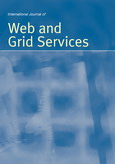
International Journal of Web and Grid Services
Exploring the nexus of technology and collaboration.International Journal of Web and Grid Services, published by INDERSCIENCE ENTERPRISES LTD, is a distinguished platform for innovative research in the realms of Web Services, Grid Computing, and Distributed Systems. Established in 2005, the journal has consistently provided a forum for groundbreaking studies, catering to the evolving needs of academia and industry professionals alike. As of 2023, it is positioned in the Q3 quartile in both Computer Networks and Communications and Software, showcasing a notable impact within the field. Researchers will find this journal instrumental in disseminating knowledge, driving advancements, and fostering collaboration in the rapidly changing technological landscape. Although it currently does not offer open access options, its commitment to high-quality peer-reviewed content ensures that it remains a vital resource for those seeking to stay at the forefront of web and grid services research. With an audience comprising both seasoned scholars and emerging professionals, the International Journal of Web and Grid Services continues to be pivotal in shaping ongoing discourse and innovation.

International Journal of Grid and Utility Computing
Empowering Research in Utility Computing ApplicationsInternational Journal of Grid and Utility Computing is a pioneering publication dedicated to advancing research in the domains of grid computing, utility computing, and their applications across various sectors. Initiated in 2005 and continuing through 2024, the journal is published by INDERSCIENCE ENTERPRISES LTD, a respected publisher known for its commitment to facilitating scholarly communication. With an ISSN of 1741-847X and an E-ISSN of 1741-8488, this journal, based in the United Kingdom, serves a global audience of researchers, professionals, and students. Although classified in the Q4 category across Applied Mathematics, Computer Science Applications, and Management Information Systems, the journal aims to bridge theoretical research with practical implementation, fostering interdisciplinary collaborations. Researchers looking for a platform to disseminate their work on grid technology and its utility in modern computing environments will find this journal an invaluable resource. The focus on innovative computing methodologies places it at the forefront of emerging trends and technology applications, despite the need for increased visibility in competitive metrics like Scopus rankings.
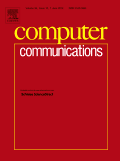
COMPUTER COMMUNICATIONS
Fostering Innovation in Network TechnologiesCOMPUTER COMMUNICATIONS is a premier journal published by Elsevier, covering cutting-edge research in the field of computer networks and communications. With an impressive 2023 Scopus ranking placing it in the 95th percentile and classified as Q1 in its category, this journal embodies the forefront of technological advancement and scholarly excellence. Since its inception in 1978 and poised to continue until 2024, COMPUTER COMMUNICATIONS serves as an essential platform for disseminating high-impact research that advances our understanding of computer networking protocols, architectures, and applications. Although it is not an open-access publication, the journal provides various access options to ensure that its findings are widely circulated among researchers, professionals, and students. Through rigorous peer review and a commitment to fostering innovation, COMPUTER COMMUNICATIONS plays a vital role in shaping the future of communication technologies.

JOURNAL OF COMMUNICATIONS AND NETWORKS
Shaping Tomorrow’s Communications LandscapeJOURNAL OF COMMUNICATIONS AND NETWORKS, published by the Korean Institute of Communications Sciences (KICS), is a leading academic journal that has been at the forefront of the fields of Computer Networks and Communications as well as Information Systems since its inception in 1999. With a strong commitment to advancing research in these critical areas, this journal has achieved a prestigious Q1 ranking in both domains as of 2023, reflecting its significant impact and innovative contributions to the field. The journal features original research, review articles, and technical notes that address the latest advancements in communication technologies, network architecture, and data management strategies. As a vital resource for researchers, practitioners, and students, it not only disseminates valuable findings but also fosters collaboration and knowledge exchange among diverse disciplines within the communications landscape. With a consistent annual volume, the journal continues to shape the future of communications science and offers authors an esteemed platform to showcase their work.
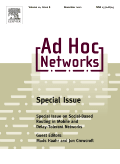
Ad Hoc Networks
Shaping the Landscape of Ad Hoc NetworkingAd Hoc Networks, published by Elsevier, is a leading journal in the fields of Computer Networks and Communications, Hardware and Architecture, and Software, with an impressive Q1 ranking in all three categories as of 2023. With an ISSN of 1570-8705 and an E-ISSN of 1570-8713, this journal offers a robust platform for disseminating cutting-edge research and advancements in network technologies, emphasizing the importance of efficient communication protocols and architectures in contemporary computing environments. Operating from the Netherlands, it has emerged as a pivotal resource for researchers and professionals seeking to explore novel methodologies, frameworks, and applications within the domain of ad hoc and wireless networks. The journal's high impact factor and Scopus rankings—44th in Computer Networks and Communications, 20th in Hardware and Architecture, and 53rd in Software—underscore its relevance and authority in the academic community. Ad Hoc Networks is committed to fostering a deeper understanding of the complexities and innovations in network design, making it an essential read for anyone invested in the future of communication technology.

Digital Communications and Networks
Transforming ideas into impactful digital solutions.Digital Communications and Networks, published by KEAI PUBLISHING LTD, stands at the forefront of research in the rapidly evolving fields of communication, computer networks, and hardware architecture. Since its inception in 2015, this open access journal has been committed to disseminating high-quality, peer-reviewed articles that contribute to technological advancements and academic discourse in these critical domains. With an impressive Impact Factor and achieving Q1 Quartile rankings in its relevant categories for 2023, it has established itself as a vital resource for researchers, professionals, and students aiming to stay ahead in a competitive landscape. The journal's robust standing is reflected in its notable Scopus rankings, underscoring its influence in Computer Science and related fields. As we look toward the future, the journal continues to invite innovative research that shapes the digital communication landscape until 2024 and beyond.

ICT Express
Leading the Charge in Cutting-edge ICT ResearchICT Express is a leading open-access journal published by Elsevier that has established itself at the forefront of the fields of Artificial Intelligence, Computer Networks and Communications, Hardware and Architecture, Information Systems, and Software. Since its inception in 2015, this South Korea-based journal has provided a vital platform for disseminating innovative research and practical applications across these rapidly evolving domains. With an impressive impact factor and consistently high Scopus rankings—placing it in the top quartiles of its categories—it attracts contributions from both seasoned experts and emerging scholars. Current access options ensure that groundbreaking findings are readily available to a global audience, thus fostering collaboration and advancement in technology and computational sciences. As ICT continues to reshape various industries, the significance of research published in ICT Express is crucial for staying ahead in the digital landscape.
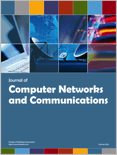
Journal of Computer Networks and Communications
Elevating Standards in Networking ResearchThe Journal of Computer Networks and Communications is a premier open-access journal published by HINDAWI LTD, dedicated to advancing the field of computer networks and communications. With an ISSN of 2090-7141 and an E-ISSN of 2090-715X, this journal has been accessible to researchers since its inception in 2011, promoting widespread dissemination of knowledge in this rapidly evolving discipline. Based in Egypt, the journal's editorial standards are upheld through a rigorous peer-review process, contributing to its strong academic reputation. As of 2023, it holds a commendable Q2 ranking in Computer Networks and Communications and a Q3 ranking in Information Systems within its category quartiles. According to Scopus rankings, it occupies the 141st and 143rd positions in its respective fields, showcasing its relevance and influence in the academic community. The journal's mission is to publish high-quality research that addresses contemporary challenges in networking technologies and systems, making it an essential resource for researchers, professionals, and students seeking to innovate and excel in these fields.
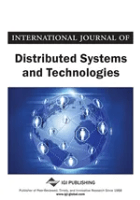
International Journal of Distributed Systems and Technologies
Exploring the Frontiers of Distributed Technologies.Welcome to the International Journal of Distributed Systems and Technologies, a prominent academic platform published by IGI Global dedicated to advancing the field of distributed systems and technologies. With an ISSN of 1947-3532 and an E-ISSN of 1947-3540, this journal, established in 2010 and continuing through 2024, offers a unique venue for researchers, professionals, and students to disseminate their findings in the realms of computer networks, communications, hardware, and architecture. Despite its current placement in the Q4 quartile for both computer networks and communications and hardware and architecture categories in 2023, the journal is committed to fostering innovative solutions and interdisciplinary collaboration that can drive future advancements. Although not open access, contributions to this journal not only receive rigorous peer review but also have the potential to significantly impact the community, underscored by a focus on applicable research that addresses the emerging challenges in technology. As part of a rich repository, the journal invites you to explore its latest issues and join in shaping the future of distributed systems.